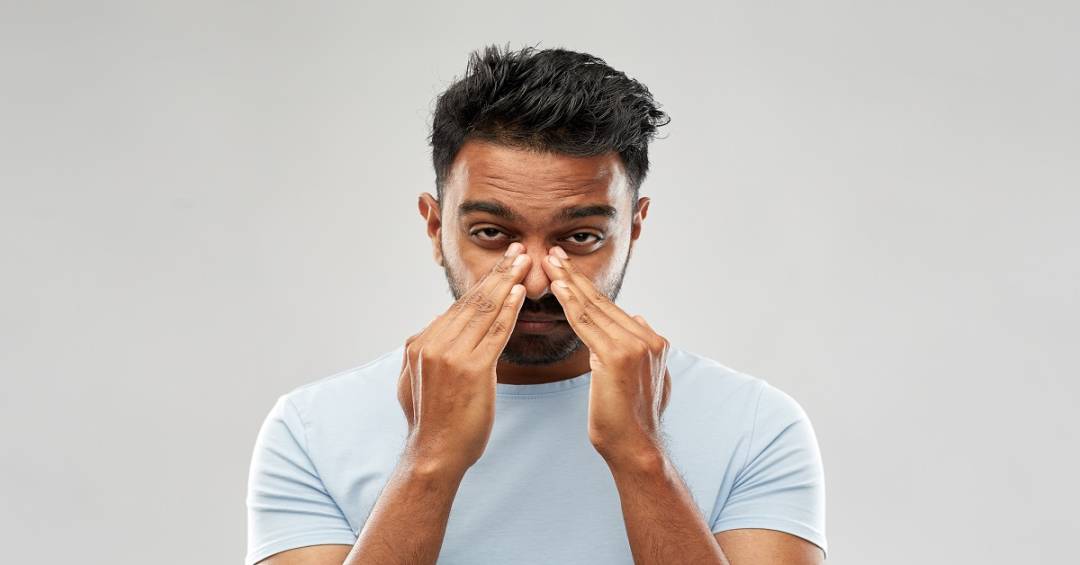1. Introduction
If you’ve ever thought, “I can’t breathe through my nose and it’s getting worse,” you’re not alone. Millions of people experience nasal blockage every day — sometimes all day, sometimes only at night, sometimes only when lying down, and sometimes due to structural problems.
Not being able to breathe through your nose affects everything:
- Your sleep
- Your energy levels
- Your breathing
- Your concentration
- Even your mood
People often search online:
- “Why can’t I breathe through my nose?”
- “I can’t breathe through my nose at night”
- “Can’t breathe at night through nose—what’s wrong?”
This complete guide explains every common and uncommon cause, proper home remedies, medical treatments, when to see a doctor, and how to finally fix the problem — so you can breathe easily again.
Table of Contents
- Introduction
- Why You Can’t Breathe Through Nose – Most Common Causes
- 2.1 Nasal Congestion
- 2.2 Deviated Septum
- 2.3 Allergic Rhinitis
- 2.4 Non-Allergic Rhinitis
- 2.5 Nasal Polyps
- 2.6 Sinus Infection (Sinusitis)
- 2.7 Enlarged Turbinates
- 2.8 Hormonal Changes
- 2.9 Structural Issues From Birth
- Can’t Breathe Through Nose at Night – Why Symptoms Get Worse
- Symptoms That Mean You Should Not Ignore Nasal Blockage
- How to Diagnose Why You Can’t Breathe Through Nose
- Proper Medical Treatments (Doctor-Approved Options)
- 6.1 Nasal Steroid Sprays
- 6.2 Antihistamines
- 6.3 Decongestants
- 6.4 Antibiotics (When Needed)
- 6.5 Nasal Saline Irrigation
- 6.6 Allergy Treatment & Immunotherapy
- 6.7 Surgery (Septoplasty, Polyp Removal, Turbinate Reduction)
- Best Home Remedies to Help You Breathe Through Your Nose Again
- Can’t Breathe Through Nose at Night – Sleep Positions & Solutions
- When to See a Doctor Immediately
- Prevention: How to Avoid Nasal Blockage Long-Term
- FAQs
- Final Thoughts
2. Why You Can’t Breathe Through Nose – Most Common Causes
Here are the real reasons why people say “I can’t breathe through my nose.”
Nasal Congestion (Most Common Cause)
Congestion happens when the tissues inside your nose become swollen due to:
- Cold
- Flu
- Allergies
- Dust
- Pollution
- Viral infections
This is the number one reason many people suddenly say “I can’t breathe through my nose.”
When congested, the nasal passages narrow, making airflow difficult.
Deviated Septum
A deviated septum means:
- The cartilage inside your nose is crooked or off-center
- Air does not move equally in both nostrils
- One side may feel “blocked” all the time
People with a deviated septum often complain:
- “I can’t breathe through my nose at night.”
- “One side of my nose is always blocked.”
A deviated septum usually requires surgery (septoplasty) if symptoms are severe.
Allergic Rhinitis
This is an allergy-based condition caused by:
- Dust
- Pollen
- Pets
- Mold
- Perfumes
- Smoke
Symptoms include:
- Sneezing
- Itchy nose
- Watery eyes
- Blocked nostrils
It is one of the biggest causes of can’t breathe through nose at night because allergens remain in bedding, carpets, and pillows.
Non-Allergic Rhinitis
Also called vasomotor rhinitis, this condition causes nasal swelling triggered by:
- Weather changes
- Strong smells
- Stress
- Alcohol
- Spicy food
Even without allergies, you may feel:
“Why can’t I breathe through my nose for no reason?”
This may be the reason.
Nasal Polyps
Polyps are soft, painless, non-cancerous growths inside the nose.
Symptoms:
- Blocked nose
- Loss of smell
- Mouth breathing
- Frequent sinus infections
Polyps commonly cause people to say:
- “I can’t breathe through my nose properly.”
They often require proper medical treatment or surgical removal.
Sinus Infection (Sinusitis)
When the sinus cavities fill with infected mucus, the pressure increases.
Symptoms include:
- Pain around eyes
- Thick yellow/green mucus
- Headache
- Blocked nose
- Facial pressure
Sinusitis can make breathing very difficult, especially when lying down.
Enlarged Turbinates
Turbinates are soft bones that warm and filter the air you breathe.
They can become enlarged due to:
- Allergies
- Inflammation
- Humidity changes
Enlarged turbinates lead to the feeling of:
“Can’t breathe at night through nose.”
Hormonal Changes
Pregnancy, menstruation, and thyroid issues can cause nasal swelling.
Many pregnant women report:
“I can’t breathe through my nose at night.”
This is normal and often temporary.
Structural Issues From Birth
Some people are simply born with:
- Narrow nasal passages
- Collapsing nostrils
- Weak cartilage
This makes airflow difficult.
3. Can’t Breathe Through Nose at Night – Why Symptoms Get Worse
Many people say:
- “I can’t breathe through my nose at night.”
- “Why can’t I breathe through my nose when I lie down?”
This happens because:
Gravity changes mucus movement
When you lie down, mucus does not drain properly.
Blood flow increases
More blood flows to your head, causing nasal tissues to swell.
Allergens in the bedroom
Dust mites, pet dander, and lint make nighttime worse.
Dry air
AC and heaters dry the nasal lining, causing blockage.
Sleep position matters
Sleeping on your back can make your airway collapse slightly.
4. Symptoms That Mean You Should Not Ignore Nasal Blockage
If you constantly say:
- “I can’t breathe through my nose.”
- “Can’t breathe through nose at night.”
Look for symptoms:
- Headaches
- Snoring
- Facial pain
- Difficulty exercising
- Dry mouth
- Bad sleep
- Fatigue
These signs mean the condition needs treatment.
5. How to Diagnose Why You Can’t Breathe Through Nose
Doctors may use:
- Nasal endoscopy
- Allergy tests
- CT scan
- Physical examination
- Sinus X-rays
A proper diagnosis helps choose the best treatment.
6. Proper Medical Treatments (Doctor-Approved Options)
If you keep saying “can’t breathe through nose”, these medical treatments can help depending on the cause.
Nasal Steroid Sprays
First-line treatment for:
- Allergies
- Polyps
- Inflammation
They shrink swollen tissues and open nasal passages.
Antihistamines
Useful for allergies and nighttime symptoms.
6.3 Decongestants
Provide fast relief but should not be used more than 3 days.
Antibiotics
Only used when a bacterial sinus infection is confirmed.
Nasal Saline Irrigation
Cleans mucus, allergens, and dust.
Doctors strongly recommend:
- Saline spray
- Neti pot
- Saline rinse bottle
Allergy Treatment & Immunotherapy
For severe allergies, long-term treatment may include:
- Allergy shots
- Oral tablets
- Lifestyle changes
Surgery
Required when:
- Deviated septum
- Nasal polyps
- Enlarged turbinates
- Structural deformities
Surgery often permanently fixes the problem.
7. Best Home Remedies to Help You Breathe Through Your Nose Again
These remedies are easy, safe, and effective.
Steam Inhalation
Clears mucus and reduces swelling.
Warm Compress
Opens nasal passages by improving blood flow.
3. Hydration
Thin mucus increases air movement.
4. Humidifier
Moist air prevents nighttime nasal blockage.
5. Hot Shower
Steam works instantly to open nostrils.
6. Garlic & Ginger Tea
Natural anti-inflammatory properties.
7. Elevate Your Head at Night
Prevents mucus from collecting in your nose.
8. Avoid Dairy Before Bed
In some people, dairy thickens mucus.
8. Can’t Breathe Through Nose at Night – Sleep Positions & Solutions
If “I can’t breathe through my nose at night” happens daily:
Sleep on your side
This reduces airway collapse.
Use two pillows
Keeps your head elevated.
Bedroom deep cleaning
Wash sheets weekly, vacuum carpets, keep pets out of the bedroom.
Use saline spray before bed
Reduces swelling.
Avoid cold air
Cold air tightens nasal tissues.
9. When to See a Doctor Immediately
Seek urgent medical attention if:
- Breathing becomes extremely difficult
- There is blood in mucus
- Vision problems occur
- You have severe facial swelling
- Symptoms last more than 3 weeks
These may indicate a serious condition.
10. Prevention: How to Avoid Nasal Blockage Long-Term
Q1: Why can’t I breathe through my nose suddenly?
- Regular cleaning of the nose
- Avoid allergens
- Use air purifiers
- Stay hydrated
- Avoid smoking
- Maintain bedroom hygiene
- Manage stress
11. FAQs
Most likely congestion, cold, or allergies.
Q2: Why can’t I breathe through my nose at night only?
Gravity, allergens, or structural problems.
Q3: Is mouth breathing harmful?
Yes — it causes bad sleep, dry mouth, and headaches.
Q4: When should I see an ENT specialist?
Any time blockage lasts more than two weeks or affects sleep.
12. Final Thoughts
Struggling to breathe through your nose — whether all day or can’t breathe through nose at night — is frustrating and affects your overall health. You now know all the possible reasons why people say:
- “Why can’t I breathe through my nose?”
- “I can’t breathe through my nose at night.”
- “Can’t breathe at night through nose.”
With the right treatment — medical or home-based — breathing clearly is completely possible.
If symptoms continue, consult an ENT doctor. Early diagnosis means faster treatment and better results.
Read More: Delta Fitness Authority: Redefining Modern Fitness with Technology and Expertise














